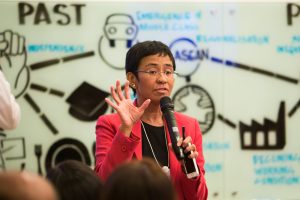President Rodrigo Duterte of the Philippines has lashed out at Facebook, a week after it deactivated a host of sock-puppet accounts that had beamed out messages supportive of his policies.
In his weekly late-night address on September 28, Duterte excoriated the social media behemoth and accused it of supporting left-wing activists opposed to his administration. “I allow you to operate here,” Duterte said. “You cannot bar or prevent me from espousing the objectives of government. Is there life after Facebook? I don’t know. But we need to talk.”
Facebook said last week that it had deactivated two networks, one based in China and one based in the Philippines, for breaching its policy on “coordinated inauthentic behavior.” In a statement, Nathaniel Gleicher, Facebook’s Head of Security Policy, said that the networks had used fake accounts to post information about a variety of subjects related to Philippine politic. According to Gleicher, the China-based network shared news in Tagalog, Chinese and English that was supportive of Duterte and his daughter Sara Duterte-Carpio, who is rumored to be considering a presidential run in 2022. It also commented on China’s assertive actions in the disputed South China Sea.
The Philippines-based network included 57 Facebook accounts, 31 Pages and 20 Instagram accounts that had coordinated content “on behalf of a foreign or government entity.” This network broadcast news and memes focusing on domestic political issues, including the recently-passed anti-terror bill and denunciations of Philippine communist groups. Some of these accounts had ties to the Philippine military and the police, Gleicher said.
In his typically gruff but circuitous manner, Duterte issued vague threats to restrict the platform in the Philippines. “Facebook, listen to me,” the Philippine leader said. “We allow you to operate here hoping that you could help us. Now, if government cannot espouse or advocate something which is for the good of the people, then what is your purpose here in my country?”
Presidential spokesman Harry Roque said that the government considered Facebook’s move “a form of censorship.” He said that the administration was “not conceding these are fake accounts.”
As Jason Gutierrez noted in The New York Times, there is a certain irony in the fact that Duterte, who cannily harnessed the social network in his meteoric rise to power, is now making vague threats to shut it down. During Duterte’s barnstorming campaign for the presidency in 2016, his allies flooded the network with fawning news about his candidacy and misinformation about his opponents. Since then, Duterte has been accused of employing bots and “troll armies” to gin up support for his policies and drown out critical commentary on Facebook.
In March of last year, Facebook suspended 68 Facebook accounts, 40 groups and 25 Instagram accounts linked to Nic Gabunada, the social media manager of Duterte’s 2016 campaign. There are 76 million people on Facebook in the Philippines, giving it the sixth-largest national user base in the world.
In his statement last week, Gleicher said that Facebook had been tipped off to the possible fake accounts by the independent news site Rappler, which has led many recent investigations into Duterte’s use and abuse of social media, as well as his administration’s blood-soaked drug war. In June, a court found Rappler co-founder and editor Maria Ressa guilty of “cyberlibel” charges, just one of a raft of pending criminal charges against her. Ressa, who is currently free on bail, has denied all of the charges, describing them as attempts by the government to silence her.
Duterte’s threats against Facebook are unlikely to amount to much. If the past four years have taught us anything, it is to take any of the Philippine leader’s off-the-cuff bluster with a large pile of salt. In January, he announced the suspension of the Visiting Forces Agreement with the United States, only to backtrack in June. He has also used macho language about China’s actions in disputed parts of the South China Sea, only to reverse course later.
Besides, given the popularity of Facebook in the Philippines, there’s no chance of Duterte actually following through on his threat to ban or restrict the social media network. If there is one thing that could kill Duterte’s popularity for good, it might just be that.

































